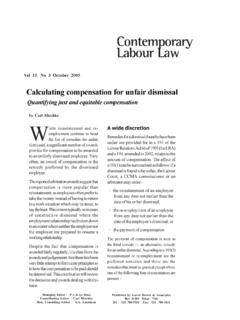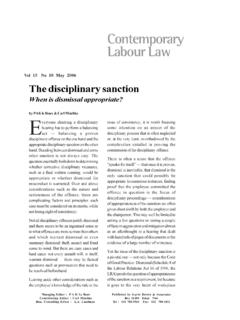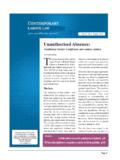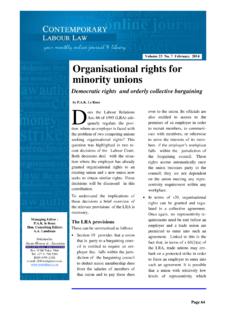Transcription of Contemporary Labour Law - workplace.co.za
1 Managing Editor : P A K Le RouxContributing Editor : Carl MischkePublished by Gavin Brown & AssociatesBox 31380 Tokai 7966 Tel : 021 788-5560 Fax: 021 788-1811 Vol. 17 No. 11 June 2008 Hon. Consulting Editor : LandmanFrom the paucity of decisions andawards relating to dismissal for illhealth, one should not, perhaps,conclude that South African employeesinvariably enjoy robust good health until theday of their retirement. Instead, it is morelikely that other forms of termination of theemployment relationship are more prevalentin cases where the employee s health hasdeteriorated to such an extent that he or shecan no longer do the work for which he orshe was ill employee may resign, for instance, andrely on social networks to survive.
2 But in alllikelihood, most ill employees are pensionedearly on medical grounds - colloquially knownas boarding .The process and requirements for medicallyboarding an employee will differ fromemployer to employer and will no doubt beregulated in some detail by the rules of thepension fund if there is nothing compares to the sheer numbersof misconduct dismissals, incapacitydismissals (as a broad category) remains theexception rather than the rule. Ill healthdismissals, in turn, seem to feature even lessthan dismissals for poor work the alternative of medical boarding,the relative rarity of these cases is, again,not entirely employers and smalldetailsThe question, said the Labour Court inStandard Bank of South Africa v CCMA& others([2008] 4 BLLR 356 (LC), waswhat the biggest bank in Africa had to do toreasonably accommodate an employee whoinjured her back in a motor collision whileon duty.)
3 When would a dismissal under thesecircumstances be fair? From the way inwhich the Labour Court approached theseissues, in a review application challenging aCCMA arbitration award, it seems that bigemployers may now have to answer probingquestions as to the detail of what they did,what they failed to do, and health and dismissalby Carl MischkeWhen will a dismissal for poor health be fair?The consequences offalse evidence LawPage 102 Contemporary Labour Law Vol 17 No 11 June 2008 The employee concerned, a Ms Ferreira, worked forthe bank for 17 years. After 15 years of distinguishedservice and stellar performance, she was injured in amotor accident while on duty and she sustainedconsiderable injuries to her back.
4 Before the accident,her work entailed a fair amount of driving. Theemployer had allowed her the use of a pool car andshe had a cellular phone allowance and a fax machineto use when working from the accident, Ms Ferreira returned to her oldjob, but because her physical condition wasdeteriorating, she could not do the work. One of thedoctors on the employer s Corporate Health Panelrecommended that she be given lighter work. A positionwas duly created and the employee then began doinglighter work of an administrative nature. The problemwas, however, that these jobs did not satisfy theemployee, she found them neither inspiring norstimulating. She had now effectively become anassistant to other employees and she had the sensethat she did not have a proper job of her own, entailingspecific things to do.
5 As a home loan consultant shehad worked under considerable pressure before heraccident; now she had to go around the office askingother employees for work simply because she did nothave enough to was then given a job that entailed her writing whileusing the telephone. This proved to be painful, but whenshe used a telephone headset when relieving anotheremployee in another department for a day or two, shefound that she could write and communicate on thetelephone at the same time without any pain. She askedher employer for a job in the other department, but theemployer, assuming that she would only be able towork half-days, refused to create such a position forher. The telephone headset she had used in the otherdepartment proved to be incompatible with thetelephone system in the department she usually practicable and sustainable solution proved employee taught herself to enter data into acomputer, but because she did not have her ownpassword (and it was an offence to use anotheremployee s password), she had her own systempassword loaded; apparently, this alone proved to bequite expensive.
6 Her immediate superior, fearing thatthe employee would enter incorrect data because hermedication made her seem drowsy, instructed her notto do this work. Instead, her supervisor and a humanresources consultant tried to persuade her to accept aposition as a switchboard operator. Understandably,perhaps, the employee saw this as a demotion anddeclined. Apparently having run out of ideas, theemployer instructed the employee to shred papers, foldfiles, receive and send facsimiles and clear out theoffice cupboards. These tasks inflicted some pain andsome of the tasks had previously been performed bythe cleaners. By assigning her these tasks, the employerhad made her feel that she was worth nothing and thisnaturally impaired her self the plot thickens unexpectedly and October 2004 Ms Ferreira was appointed as a homeloan fulfilment officer, a couple of steps up fromshredding and folding files.
7 She saw this as a vote ofconfidence in her abilities. But just more than a monthlater the employer told her that she would be dismissedas from the end of December of the same to the Labour Court, the reason given bythe employer was incapacity which resulted in highabsenteeism and low was quite a conundrum for the employer: anemployee, anxious to work, but not satisfied with justany old job. An opinion from the medical practitionerof the employer s panel that the employee could stillwork, but that she had to be given lighter work. Finally,the employee s immediate superior and the humanresources consultant who, no doubt in good faith, triedto find a solution to the problem, but foundconsiderations of cost, equipment and workflowhampering their efforts to find the employee somethingto do commensurate with her experience.
8 This was,after all, an employee who had been one of the toptwelve performers in the bank with over 15 years ofdedicated service, The bank knew what she wascapable of and how committed she was to theemployer. At the same time, her absenteeism was aproblem: she was absent for 74 days in one year and116 days the following year. She could not, as a rule,work beyond midday and she often came to work inpain. Page 103To do or not to doThe Labour Court devoted considerable attention towhat the employer did or did not do. At first glance,said the Court, the employer was patient, tolerant andeven charitable. It had not adjusted her salary and herimmediate superior often sent her home if she was intoo much pain to work.
9 Other employees were alsoconcerned and ready to help. The employer even gaveher four months sick leave at one point to help herrecover. And, of course, attempts had been made tofind her a suitable the other side of the scale weighed heavily onwhat the employer had not done. The employer hadfailed to engage an occupational therapist to report onredesigning the employee s workstation. There wassome uncertainty, before the Court, as to who wasresponsible for obtaining a report from an occupationaltherapist, and the Court again looked at the evidencecarefully. In summary, said the Court, it was theemployer s obligation to obtain an occupational therapyreport in order to justify its dismissal.
10 In this case theemployer did not want to obtain a report because itreally wanted to dismiss the employee: an occupationaltherapist may well have directed the bank toaccommodate the employee, and this, said the Court,the employer was not prepared to other issue that weighed heavily on the Court smind was the fact that the employee was not given aheadset to operate the telephones comfortably. Theemployer s view on this was that it was not costeffective and that the pace of work would have beentoo hectic for the employee. As mentioned earlier, whenit came to the employee s entering data into thecomputer, her immediate manager felt that she was sort of sleeping at work and that the employer couldtherefore not trust her with the responsibility of is all about the practicalities, no matter how small orinsignificant they may appear to be.















